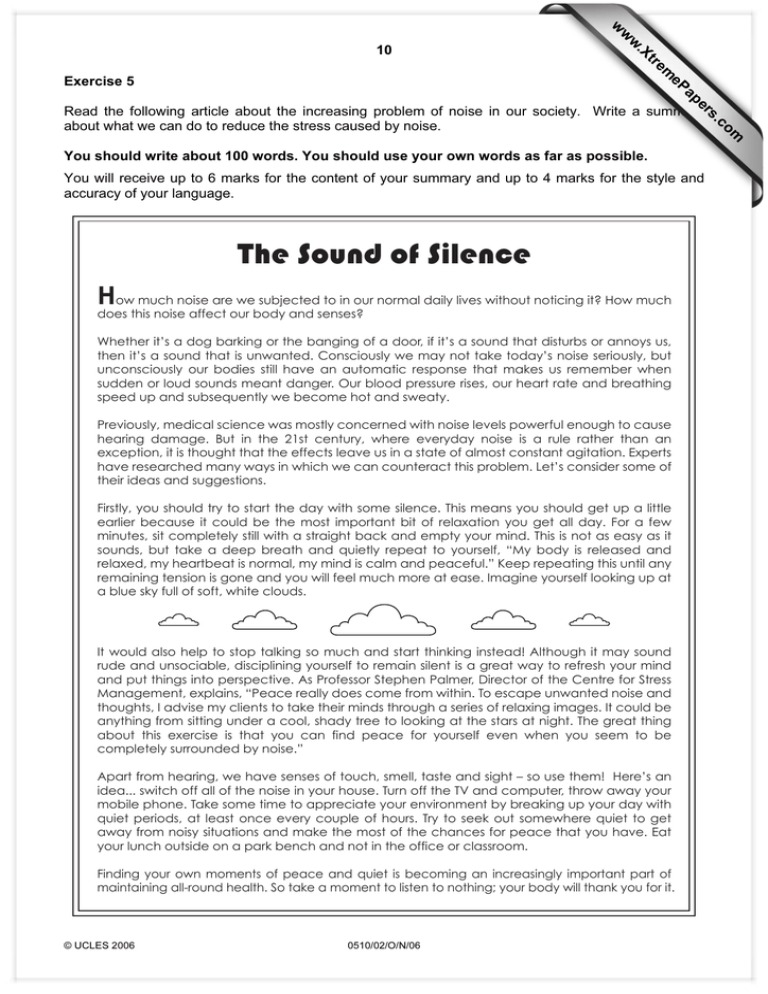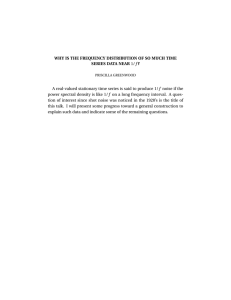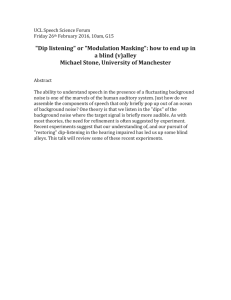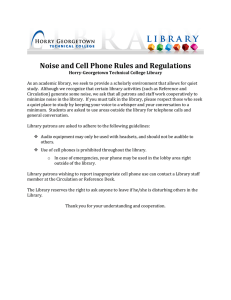www.XtremePapers.com
advertisement

w w m e tr .X w 10 ap eP Exercise 5 You should write about 100 words. You should use your own words as far as possible. You will receive up to 6 marks for the content of your summary and up to 4 marks for the style and accuracy of your language. The Sound of Silence H ow much noise are we subjected to in our normal daily lives without noticing it? How much does this noise affect our body and senses? Whether it’s a dog barking or the banging of a door, if it’s a sound that disturbs or annoys us, then it’s a sound that is unwanted. Consciously we may not take today’s noise seriously, but unconsciously our bodies still have an automatic response that makes us remember when sudden or loud sounds meant danger. Our blood pressure rises, our heart rate and breathing speed up and subsequently we become hot and sweaty. Previously, medical science was mostly concerned with noise levels powerful enough to cause hearing damage. But in the 21st century, where everyday noise is a rule rather than an exception, it is thought that the effects leave us in a state of almost constant agitation. Experts have researched many ways in which we can counteract this problem. Let’s consider some of their ideas and suggestions. Firstly, you should try to start the day with some silence. This means you should get up a little earlier because it could be the most important bit of relaxation you get all day. For a few minutes, sit completely still with a straight back and empty your mind. This is not as easy as it sounds, but take a deep breath and quietly repeat to yourself, “My body is released and relaxed, my heartbeat is normal, my mind is calm and peaceful.” Keep repeating this until any remaining tension is gone and you will feel much more at ease. Imagine yourself looking up at a blue sky full of soft, white clouds. It would also help to stop talking so much and start thinking instead! Although it may sound rude and unsociable, disciplining yourself to remain silent is a great way to refresh your mind and put things into perspective. As Professor Stephen Palmer, Director of the Centre for Stress Management, explains, “Peace really does come from within. To escape unwanted noise and thoughts, I advise my clients to take their minds through a series of relaxing images. It could be anything from sitting under a cool, shady tree to looking at the stars at night. The great thing about this exercise is that you can find peace for yourself even when you seem to be completely surrounded by noise.” Apart from hearing, we have senses of touch, smell, taste and sight – so use them! Here’s an idea... switch off all of the noise in your house. Turn off the TV and computer, throw away your mobile phone. Take some time to appreciate your environment by breaking up your day with quiet periods, at least once every couple of hours. Try to seek out somewhere quiet to get away from noisy situations and make the most of the chances for peace that you have. Eat your lunch outside on a park bench and not in the office or classroom. Finding your own moments of peace and quiet is becoming an increasingly important part of maintaining all-round health. So take a moment to listen to nothing; your body will thank you for it. © UCLES 2006 0510/02/O/N/06 om .c s er Read the following article about the increasing problem of noise in our society. Write a summary about what we can do to reduce the stress caused by noise. 11 For Examiner's Use [10] © UCLES 2006 0510/02/O/N/06 [Turn over


